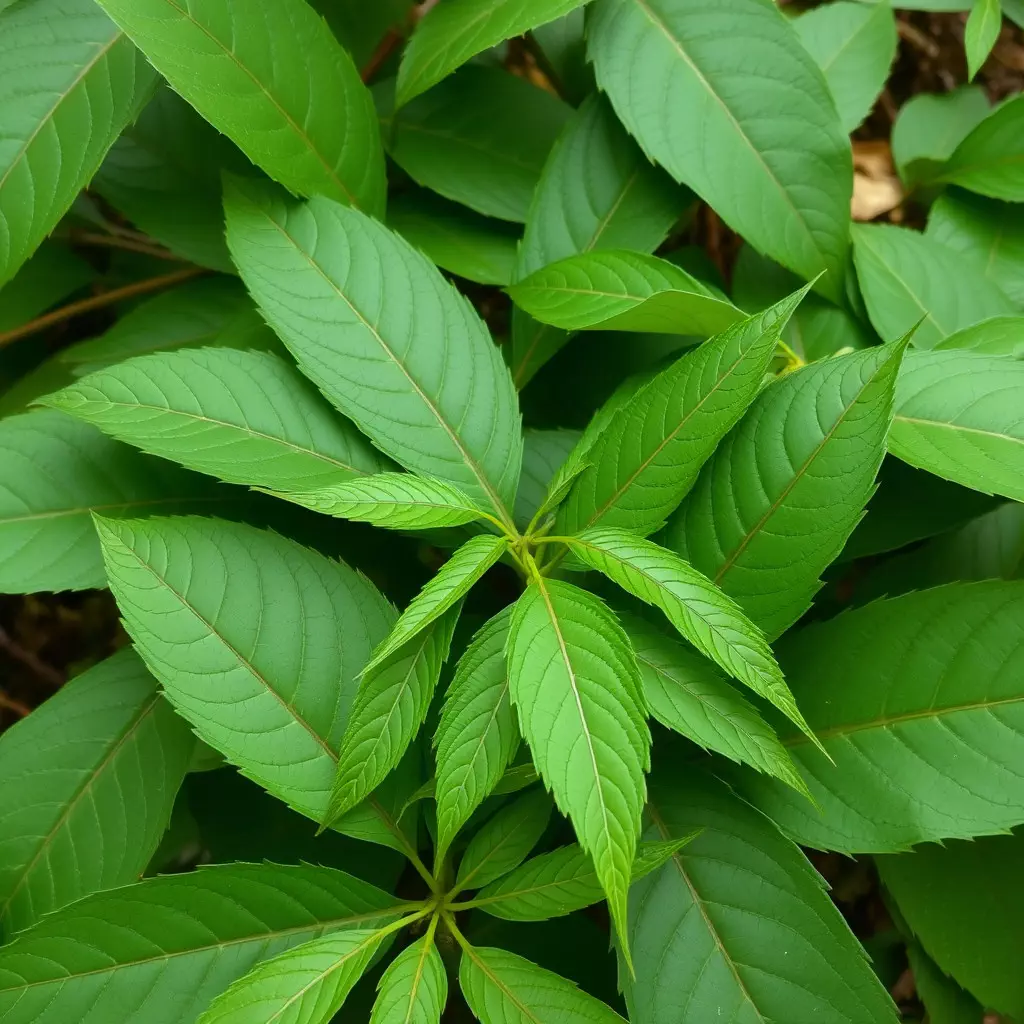The section discusses the potential benefits of Kratom for post-workout recovery, particularly within the context of addiction treatment. Kratom, from the Mitragyna speciosa plant, contains alkaloids that can interact with opioid receptors, offering pain relief and mood enhancement, which are beneficial for those recovering from addiction. Its anti-inflammatory properties may aid muscle healing and recovery, potentially improving athletic performance over time. Kratom's influence on dopamine and serotonin could contribute to a more stable emotional state during recovery. However, it is essential to consult healthcare professionals before using Kratom due to individual variability in responses and the potential risks and legal considerations associated with its use. A responsible approach to integrating Kratom-Fueled Post-Workout Recovery into addiction treatment involves considering personal health history, substance use patterns, and recovery milestones, ensuring it is used safely and effectively alongside a comprehensive treatment plan that includes psychotherapy, support groups, nutrition, and exercise for holistic wellness. Users should obtain high-quality Kratom from reputable sources and adhere to recommended dosages while being educated on its effects and potential interactions. This approach can enhance physical recovery post-exercise and increase resilience against relapse for those in addiction recovery.
Kratom has emerged as a multifaceted tool in the realm of addiction treatment and recovery, offering promising avenues for those seeking to enhance their post-workout recovery. This article delves into the scientific underpinnings of Kratom’s effects on muscle soreness and its role in pain management during recovery. Furthermore, it explores the integration of Kratom into holistic addiction programs, providing a comprehensive overview of best practices and considerations for its use. By examining “Kratom-Fueled Post-Workout Recovery,” we uncover potential benefits and address safety and efficacy concerns. This exploration aims to shed light on the nuanced application of Kratom as part of a balanced recovery strategy.
- Unraveling Kratom's Role in Enhancing Post-Workout Recovery for Addiction Treatment
- The Science Behind Kratom's Effects on Muscle Soreness and Pain Management in Recovery
- Integrating Kratom into a Holistic Addiction Recovery Program: Best Practices and Considerations
Unraveling Kratom's Role in Enhancing Post-Workout Recovery for Addiction Treatment

Kratom, derived from the leaves of Mitragyna speciosa, has garnered attention in the realm of natural supplements for enhancing post-workout recovery, particularly within the context of addiction treatment. Its effectiveness as a recovery aid is attributed to its unique blend of alkaloids, such as mitraphylline and 7-hydroxymitragynine, which may interact with opioid receptors in the body. These compounds are believed to influence pain perception and mood, potentially reducing discomfort associated with intense physical activity while promoting a sense of well-being. This dual action can be particularly beneficial for individuals undergoing addiction treatment, as it offers a natural alternative to manage withdrawal symptoms and support overall recovery.
Incorporating Kratom into a post-workout regimen may offer numerous advantages for those in recovery. The anti-inflammatory properties of Kratom could help alleviate muscle soreness, accelerating the healing process and improving athletic performance over time. Additionally, its potential to modulate dopamine and serotonin levels might contribute to a more stable emotional state, which is crucial for individuals facing the psychological challenges of addiction recovery. By leveraging Kratom-Fueled Post-Workout Recovery, individuals may experience enhanced muscle repair, reduced fatigue, and an improved mood, all of which are conducive to a healthier lifestyle in recovery. However, it is imperative to consult with healthcare professionals before integrating Kratom into any treatment or recovery plan, as individual responses to Kratom can vary, and its use may carry potential risks or legal considerations.
The Science Behind Kratom's Effects on Muscle Soreness and Pain Management in Recovery

Kratom, a plant native to Southeast Asia, has garnered attention in the realm of natural pain management and post-workout recovery due to its alkaloid profile, which includes mitragynine and 7-hydroxymitragynine. These compounds are believed to interact with opioid receptors in the brain, providing analgesic effects that can alleviate muscle soreness and pain. In the context of addiction treatment and recovery, individuals often experience physical discomfort as a result of withdrawal symptoms and the stress on their bodies from detoxification. Kratom-fueled post-workout recovery may offer a twofold benefit for those in recovery: mitigating pain and enhancing the recovery process of overexerted muscles. The anti-inflammatory properties of kratom strains such as Maeng Da or Bali are particularly beneficial, potentially reducing swelling and facilitating healing in sore muscles after intense physical activity. Additionally, the mild stimulant effects of certain kratom strains can increase energy levels and motivation, encouraging individuals to engage in regular exercise, which is a critical component of holistic recovery programs. Users report that incorporating kratom into their post-workout routine not only helps manage pain but also promotes a sense of well-being and improved mood, which are essential for maintaining mental health during the recovery journey. However, it is important to approach the use of kratom with caution, as it can interact with other substances and may have side effects. Users should consult healthcare professionals before integrating kratom into their recovery regimen to ensure safety and efficacy.
Integrating Kratom into a Holistic Addiction Recovery Program: Best Practices and Considerations

Integrating Kratom into a holistic addiction recovery program requires careful consideration and adherence to best practices to ensure efficacy and safety for individuals seeking treatment. Kratom, derived from the leaves of the Mitragyna speciosa tree, has been traditionally used for its stimulant and sedative effects, which may aid in post-workout recovery as well as manage withdrawal symptoms associated with addiction. Within a recovery context, it is important to approach Kratom use with caution, as it is a controlled substance with potential for abuse and dependency. Healthcare providers should work closely with patients to evaluate the appropriateness of Kratom within their personalized treatment plan. They must consider the individual’s medical history, current substance use patterns, and the specific recovery goals they aim to achieve. Monitoring progress and adjusting the treatment protocol as needed is essential, ensuring that Kratom-fueled post-workout recovery is integrated safely and effectively, without interfering with the overall objectives of the recovery program.
When incorporating Kratom into a holistic addiction recovery regimen, it is crucial to emphasize a multifaceted approach that includes psychotherapy, support groups, nutrition, exercise, and complementary wellness practices. This comprehensive strategy supports the individual’s physical, mental, and emotional well-being. For those who opt to use Kratom as part of their recovery toolkit, it is advisable to source high-quality products from reputable vendors, adhering to recommended dosages to mitigate risks. Additionally, ongoing education about the substance’s effects, potential interactions with other medications, and the importance of a balanced lifestyle cannot be overstated. By integrating Kratom into a holistic program thoughtfully and responsibly, individuals may find enhanced support for their physical recovery post-workout, as well as improved resilience against relapse.
In conclusion, the potential of Kratom-Fueled Post-Workout Recovery as a component in addiction treatment and recovery is an area rich with scientific intrigue. The evidence suggests that Kratom can play a pivotal role in managing muscle soreness and pain, which are often barriers to consistent physical activity during recovery. Integrating Kratom into holistic addiction programs, when done thoughtfully and under medical supervision, offers a promising avenue for enhancing overall well-being and supporting long-term sobriety. It is clear that further research is essential to fully understand Kratom’s efficacy and best practices for its use in this context. As we continue to explore the science behind Kratom’s effects, it is hoped that this natural substance will be recognized as a valuable tool in the recovery journey for those struggling with addiction.






